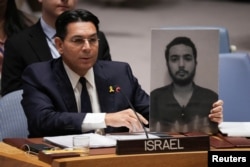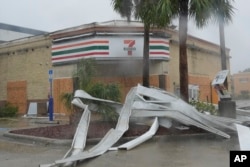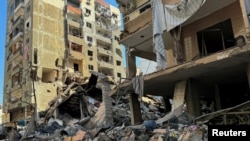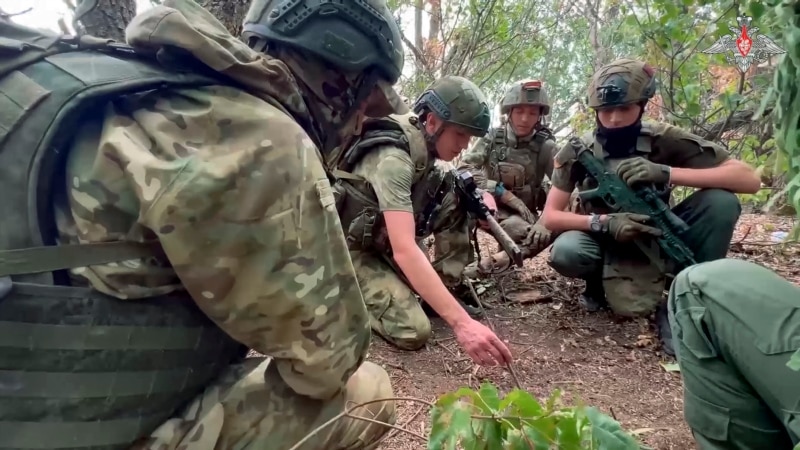U.N. Security Council members expressed frustration Wednesday with the failure to conclude a cease-fire and hostage release deal between Israel and Hamas, amid the killing of six Israeli hostages and the escalation of violence in the West Bank.
“There is a sense of outrage felt around the globe,” said Slovenia’s Ambassador Samuel Žbogar, whose delegation holds the council’s rotating presidency this month. “Outrage in Palestine that the international community is failing them; outrage on Israeli streets that the hostages continue being held in Gaza; outrage of the global public that this war does not stop.”
During a meeting requested by Israel about the six hostages killed by Hamas, whose bodies were recovered Saturday, Žbogar reminded the 15-nation council that it is its job to push for peace.
Algeria also requested that the council discuss the escalation of violence in the West Bank, where the United Nations says at least 30 Palestinians have been killed, including seven children, since Israel launched a large-scale military operation on August 27.
“It is gravely alarming that with each briefing this council receives, the situation in the Occupied Palestinian Territory and Israel steadily worsens,” Malta’s Ambassador Vanessa Frazier said.
There was general concern that U.S., Egyptian and Qatari efforts to broker a cease-fire and hostage release deal have not been successful after three months of mediation, especially after the Security Council backed the deal in a resolution on June 10.
“Things have only gotten worse for Palestinians, for Israeli hostages and indeed the entire region since adoption of that resolution,” Ambassador Carolyn Rodrigues-Birkett of Guyana said.
U.S. envoy Linda Thomas-Greenfield urged patience.
“Diplomacy is not a matter of snapping our fingers and — voila. It takes hard work. It takes effort, and unfortunately, it takes time,” she said. “It has not failed.”
She noted that diplomacy helped secure the release in November of more than 100 of the 250 hostages that Hamas took during its terror attack on October 7, 2023.
“And it is through diplomacy that we aim to bring the remaining hostages home and finally put this horrific conflict on a path toward a durable conclusion,” Thomas-Greenfield said. “The Israeli people should understand that the deal on the table is one their leaders can accept, because this is a deal that ensures Israel’s security.”
In Washington, a senior Biden administration official told reporters that cease-fire negotiations were ongoing and a deal was “basically done,” except for two sticking points: which Palestinian prisoners will be released in exchange for the remaining hostages, and where Israeli forces will be deployed during phase one of the deal. Israel has demanded it retain control of the Philadelphi Corridor, a 14-kilometer strip of land in the Egypt-Gaza border area.
During a press conference Wednesday in Jerusalem, Israeli Prime Minister Benjamin Netanyahu stuck to his position that the corridor was non-negotiable.
“So, we said, as far as Gaza is concerned, three war goals: The first war goal was to destroy Hamas’ military and governing capabilities. The second was to free our hostages, and the third was to ensure that Gaza never again poses a threat to Israel,” he said. “And all three of those goals, all three of them, go through Israel’s control of the Philadelphi Corridor.”
Hamas has accused Israel of dragging out negotiations by issuing new demands, including that Israel remain in control of the Philadelphi Corridor and a second corridor running across Gaza.
In Tel Aviv, family members of some of the remaining hostages protested Wednesday outside the headquarters of Netanyahu’s Likud Party, calling for a cease-fire deal with Hamas that includes the release of their relatives.
Hamas militants killed about 1,200 people and captured some 250 hostages during the October 7 terror attack on southern Israel. The Israeli counteroffensive has killed nearly 41,000 Palestinians in Gaza, most of them women and children, according to Gaza health officials, while the Israeli military says the death toll includes several thousand Hamas combatants.
Hamas has been designated a terror group by the United States, the United Kingdom and other Western countries. At the Security Council on Wednesday, Israel’s envoy reiterated his demand that council members designate Hamas a terror organization.
VOA’s Margaret Besheer, Patsy Widakuswara and Natasha Mozgovaya contributed to this report. Some information came from The Associated Press, Reuters and Agence France-Presse.









